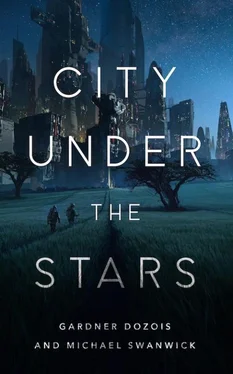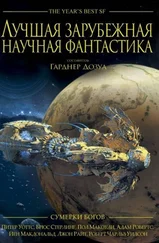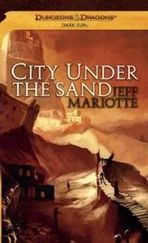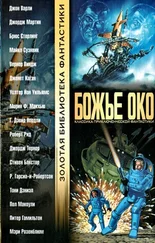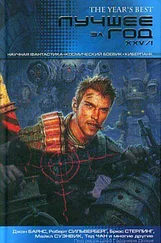It did not look right. Hanson knew there was some other way that Heaven should look, though he lacked the ability to put it into words. More beautiful, somehow. More symmetrical, perhaps. It should be bizarre and wonderful and, yes, strange, certainly strange. But not like this . Never like this. He turned back to the thin man, who was still waiting patiently on him. “Are you… an angel?”
An urbane, undeniably sympathetic, and self-dismissive gesture. “I am a function. You have been in the lands of the Renunciates for so long a time that you can no longer recall your origins. Until you recover your memory, you may call upon my services as your interface and guide.”
“My memory,” Hanson said flatly. He could make sense of none of this.
“Your friend is anxious to see you.”
He cast his mind back, awkwardly groping for meaning. Anyone who could have been counted a friend of his, by however loose a reckoning, was either long dead or left behind in Orange; he had no friends anymore, not unless you counted the Preacher, and he—“My friend is dead.”
“Not any longer.”
* * *
The Preacher sat in the grass of a nearby hollow, running a finger around and around the inside of his mouth, admiring his perfect new teeth. He smiled broadly at Hanson. “Quite a set of choppers, eh?” Then, indicating the thin man, “Don’t pay any mind to Cicero. He’s not real.”
“He said he was a function.”
“It means the same thing. I told him to let you sleep, figured you could use it. Me, I’ve been up for hours. How do you feel?”
“Fine,” Hanson said uncomfortably. He slapped his hands together, and then, as he realized what he’d done, raised them up to his face in wonderment: the places on the palm and the tip of the one finger that the Wall had eaten away had been completely, magically healed. And, now that he thought about it, he really did , he felt just fine! A hundred small aches and aggravations were gone, from the sour tooth that had nagged dimly from the back corner of his mouth for as long as he could remember to the thorn scratches and sticker-rashes he’d incurred blundering into the mile-a-minute vines last night—gone, as if they had never been. He rotated his neck and it didn’t make the little crackling noises that he had grown accustomed to. Even the gut-pain of the Crab, by God, even that was gone! Something moved deep within him, a small and hurtful aching sensation so alien to his nature that it took him a second to identify it.
Hope.
“By God,” he breathed. “By God, Preacher, I—”
“Boone!” the little man snapped. “My name is J. Pickett Boone, and don’t you forget it!”
Startled, Hanson looked hard at him. There was a clear light in Boone’s eyes; the mental confusion of earlier was gone. He held himself like a supervisor now. Not only his body had been healed by his passage into Heaven, it seemed, but his mind as well. And with his newfound clarity of thought must surely have come memories of his association with the outlaw band, and humiliation about the services he had provided them in his long evasion of the Wall. Boone was glaring up at him with a fierce intensity, fists clenched, trembling, like a terrier-dog working itself up to attack a bull. Hanson found that he despised Boone less than before, and, paradoxically, disliked him more.
He dropped his eyes. “Didn’t mean anything by it,” he mumbled.
For a long, still moment, Boone’s face remained closed, tight, hostile. Then he made a curt, dismissive gesture. The balance of power between them had shifted, subtly but surely; immediately, Hanson regretted having let the moment slide by the way he had. But it was too late, no use trying to put the egg back into the shell, what was done was done. The little man stood and stretched and looked searchingly about him, staring into the middle distance where the grassland rose in great arched ribs, under which birds flew and atop which were trees and grazing deer, and beyond, at the ranges of what were either strange mountains or even stranger buildings. Boone looked upon the bizarre structures of Heaven with shrewd, knowledgeable eyes; they clearly did not seem strange to him …
Cicero stood nearby with that blank, alert look of his. Hanson felt oddly reluctant to address his questions to him. Lowering his voice, he said, “Boone, I can’t make any sense out of”—he swept a hand to take in everything, the buildings he could almost comprehend one at a time but could not assemble into a single coherent picture, could not seem to hold in his mind all at the same time—“all this.”
“Are you a religious man?” Boone asked.
The question took him aback, it had been so long a time since anybody had asked him anything remotely like it. Religion was not the sort of thing a man like him was expected to have an opinion on. “I don’t think so.”
“Then maybe there’s some slight chance of your understanding.” The little man spoke in a fussy, professorial manner, falling back to the rhythms and cadences of his long-forgotten former life. “Hanson, the City of God isn’t any such thing. Got that? It’s not inhabited by gods or angels or anything of the sort, but by people. People like you and me.”
“Uh…”
“Did you ever try to imagine what it was like to live in the time of the Utopians?”
“Well—yeah. Sure. A little, sometimes.”
“Not exactly easy, was it? Once you got past having all the food and clean water you ever wanted, good clothes, a soft bed, and never having to do sweat-work again in your life, could you picture exactly what you’d be doing with all that wealth, all those machines, how it would feel to be a Utopian?”
Hanson shook his head.
“Well, all that—the clean water, the limitless food, the ease and comfort, heat in the winter and cool breezes in the summer that squirt out of a machine at the twist of a knob—was just the beginning . Wealth creates wealth and knowledge builds upon knowledge. During the era of the Utopians, knowledge went into a period of exponential increase, and, in one grand surge—from my researches, I have reason to believe it happened within the span of a single human lifetime—people gained control of such immense powers and such total freedoms that… Well, it changed them. The people who resulted from this change—let’s call them the post-Utopians—would have been as incomprehensible to the Utopians as the Utopians are to us. They have wealth and power beyond your craziest dreams. Far beyond anything you even can imagine. They are like gods in their power, and yet they’re not gods. They are only post-Utopians. Remember that. They’re just people with all the technology, all the wealth, all the power anyone could ever want.”
Hanson could follow what Boone was saying. He could even understand it. But somehow he could not fit his head around it, could not encompass it, could not feel and accept the truth of it. It was all too strange. He struggled to put into words some reason why he could not entirely accept it. “But—” he began.
He stopped, swallowed, tried again.
“But then—why the Wall?”
“I don’t know.” Boone began walking and Hanson had no choice but to follow. Cicero trailed after them like an obliging shadow. “Let’s ask them.”
Not many paces distant were two silver metal plates, each roughly ten feet in diameter. With no particular emphasis, Boone strolled onto one. Hanson and Cicero followed.
Something like a twisty silver pillar, a metal cyclone, shot up from the other plate into the air, disappeared into the clouds, and then with a mad looping motion came rushing down upon them. Cicero’s hand squeezed Hanson’s shoulder reassuringly. “Wait.” He heard the word but could not parse its meaning, could not even attempt to run, could do nothing in fact but stand rooted where he was in horror. The crazy thought flitted through his head that now he knew how a mouse felt just before being stepped on by an horse, and then the cyclone slammed down upon them.
Читать дальше
